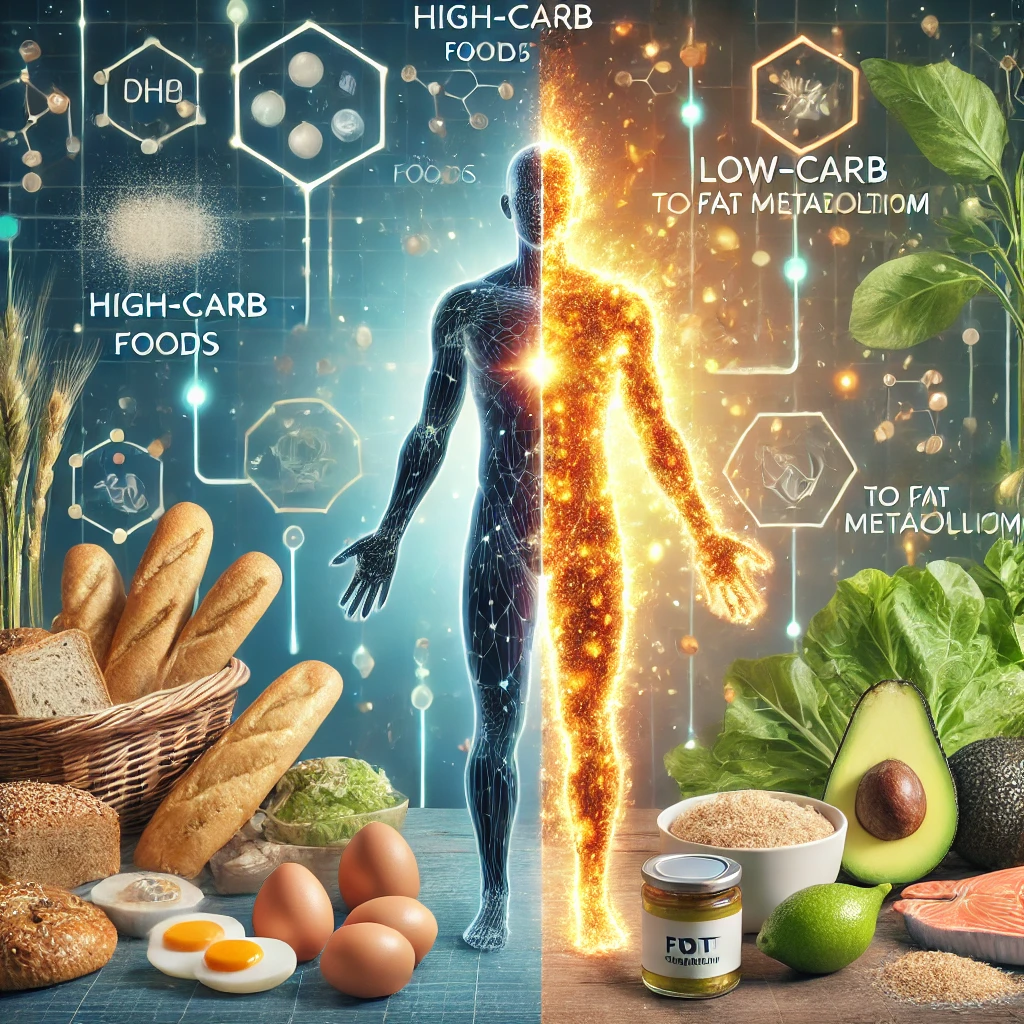Introduction
Low-carb diets have been around for years, but recently, they’ve gained a lot of attention. From the Atkins Diet to keto, many people swear by cutting carbs to lose weight, boost their health, and even sharpen their focus. But what does science say? Are low-carb diets truly effective, or just another passing trend? In this post, we’ll dive into the science behind low-carb eating, how it affects metabolism, and what it really means for your overall health.
What is a Low-Carb Diet?
A low-carb diet focuses on cutting down carbohydrates while increasing protein and healthy fats. Carbs, found in foods like bread, pasta, rice, and sugar, are the body’s main energy source. When you reduce carb intake, your metabolism shifts, changing how your body produces and stores energy.
Different Types of Low-Carb Diets
- Ketogenic Diet (Keto) – Extremely low in carbs (usually under 50g per day) and high in fat to trigger ketosis, a state where the body burns fat for energy.
- Atkins Diet – Starts with very few carbs and gradually reintroduces them over time.
- Paleo Diet – Focuses on whole, unprocessed foods that are naturally low in carbs.
- Low-Carb, High-Fat (LCHF) Diet – A flexible approach that emphasizes healthy fats and proteins over carbs.
How Low-Carb Diets Affect Metabolism
When you cut down on carbs, your body adapts in several ways:
Improved Satiety and Appetite Control
Low-carb diets tend to be high in protein and healthy fats, which help keep you full for longer. This makes it easier to eat fewer calories naturally, without constantly feeling hungry.
Burning Fat for Fuel (Ketosis)
With fewer carbs available, your body shifts to burning fat for energy. The liver converts fats into ketones, which serve as an alternative fuel source—especially for the brain.
Lower Insulin Levels
Carbs cause insulin spikes, which promote fat storage. By reducing carbs, insulin levels drop, allowing your body to burn fat more efficiently.
The Science Behind Low-Carb Diets and Weight Loss
Research shows that low-carb diets can be highly effective for weight loss. Here’s why:
Better Fat Burning (Fat Oxidation)
With lower insulin levels, your body becomes more efficient at using stored fat for energy, making fat loss easier.
Fat Loss vs. Water Weight
In the first few days, most weight loss comes from shedding water since carbs help retain water in the body. However, over time, low-carb diets also lead to real fat loss by reducing calorie intake and adapting metabolism.
Higher Calorie Burn (Thermogenic Effect)
Digesting protein requires more energy than digesting carbs, meaning your body burns slightly more calories just by processing food.
The Impact of Low-Carb Diets on Health
Lower Inflammation
Refined carbs are known to contribute to inflammation, which is linked to many chronic diseases. Cutting them out can help reduce inflammation and improve overall health.
Heart Health
Despite the common belief that high-fat diets are bad for the heart, low-carb diets can actually improve cholesterol levels. They help raise HDL (the “good” cholesterol) and lower triglycerides, both of which support heart health.
Better Blood Sugar Control
For people with type 2 diabetes, low-carb diets have been shown to improve blood sugar levels and increase insulin sensitivity, making diabetes management easier.
Sharper Brain Function
Some studies suggest that ketones provide a more stable energy source for the brain, helping improve focus and reduce brain fog.
Debunking Common Low-Carb Diet Myths
🔹 “Low-carb diets harm your kidneys.”
Research shows that low-carb diets do not negatively affect kidney function in healthy individuals. The concern mostly applies to those with pre-existing kidney disease.
🔹 “You need carbs for energy.”
While carbs are a source of energy, your body can efficiently switch to burning fat for fuel, making carbs non-essential.
🔹 “Low-carb diets lack fiber.”
Not true! You can get plenty of fiber from non-starchy vegetables, nuts, and seeds—all of which fit perfectly into a low-carb lifestyle.
1. Can I build muscle on a low-carb diet?
Absolutely! As long as you’re getting enough protein and healthy fats, you can gain muscle on a low-carb diet. Many athletes and bodybuilders successfully follow ketogenic or high-protein, low-carb diets.
2. Will I feel tired when switching to a low-carb diet?
Some people experience temporary fatigue, often called the “keto flu,” when first starting. This usually lasts a few days as your body adapts to using fat for fuel. Staying hydrated and replenishing electrolytes can help ease the transition.
3. Is a low-carb diet safe long-term?
Yes! Research suggests that low-carb diets can be safe and beneficial for long-term health, especially when based on whole, nutrient-dense foods.
4. Can I eat fruit on a low-carb diet?
Yes, but in moderation. Berries like strawberries, raspberries, and blueberries are lower in carbs compared to fruits like bananas or apples, making them a better option.
5. Do I need to count calories on a low-carb diet?
Not necessarily. Low-carb diets naturally promote fullness, so most people eat fewer calories without tracking. However, monitoring intake can be helpful for weight loss or muscle gain.
6. What are the best fats to eat on a low-carb diet?
Stick to healthy fats like avocados, olive oil, nuts, seeds, and fatty fish. Avoid processed trans fats and unhealthy oils.
7. Can a low-carb diet improve mental clarity?
Yes! Many people report better focus and brain function on a low-carb or keto diet, as ketones provide a steady energy source for the brain.
8. How do I handle carb cravings?
Eating enough protein and healthy fats can help curb cravings. Staying hydrated and maintaining proper electrolyte balance also makes a big difference.
Conclusion
Low-carb diets are backed by science for weight loss, metabolic benefits, and overall health improvements. While they may not be the right fit for everyone, understanding how they work allows individuals to make informed choices. The key to long-term success is personalizing your diet to fit your health needs and lifestyle.

1 thought on “The Science Behind Low-Carb Diets: How They Work and Why They Matter”
Comments are closed.